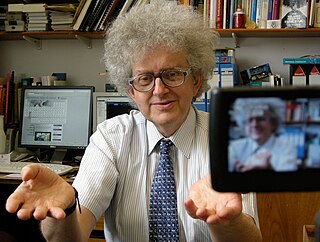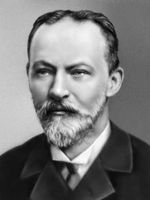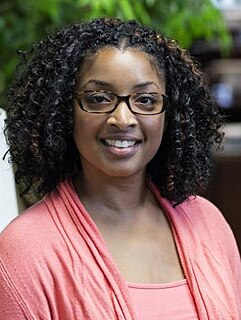Related Research Articles

The Royal Society of Chemistry (RSC) is a learned society in the United Kingdom with the goal of "advancing the chemical sciences". It was formed in 1980 from the amalgamation of the Chemical Society, the Royal Institute of Chemistry, the Faraday Society, and the Society for Analytical Chemistry with a new Royal Charter and the dual role of learned society and professional body. At its inception, the Society had a combined membership of 34,000 in the UK and a further 8,000 abroad. The headquarters of the Society are at Burlington House, Piccadilly, London. It also has offices in Thomas Graham House in Cambridge where RSC Publishing is based. The Society has offices in the United States at the University City Science Center, Philadelphia, in both Beijing and Shanghai, China and Bangalore, India.

Sir Edward Frankland, was an English chemist. He was one of the originators of organometallic chemistry and introduced the concept of combining power or valence. An expert in water quality and analysis, he was a member of the second royal commission on the pollution of rivers, and studied London's water quality for decades. He also studied luminous flames and the effects of atmospheric pressure on dense ignited gas, and was one of the discoverers of helium.

Andrew Zbigniew Szydlo is a British chemist and chemistry teacher, best known for his talks and lectures on chemistry.

Charles Wayne Rees CBE FRS FRSC was a British organic chemist.

Sir Martyn Poliakoff is a British chemist, working on gaining insights into fundamental chemistry, and on developing environmentally acceptable processes and materials. The core themes of his work are supercritical fluids, infrared spectroscopy and lasers. He is a research professor in chemistry at the University of Nottingham. His group comprises several members of staff, postdoctoral research fellows, postgraduate students and overseas visitors. As well as carrying out research at the University of Nottingham, he is a lecturer, teaching a number of modules including green chemistry.

Bohuslav Brauner was a Czech chemist from the University of Prague, who investigated the properties of the rare earth elements, especially the determination of their atomic weights. Brauner predicted the existence of the rare earth element promethium ten years before the existence of the gap was confirmed experimentally. In the 1880s, when he already had started lecturing in Prague, he still competed internationally in cycling races.

Ida Freund was the first woman to be a university chemistry lecturer in the United Kingdom. She is known for her influence on science teaching, particularly the teaching of women and girls. She wrote two key chemistry textbooks and invented the idea of baking periodic table cupcakes, as well as inventing a gas measuring tube which was named after her.
Stephen T. Liddle FRSE FRSC is a British professor of inorganic chemistry at the University of Manchester. He is Head of Inorganic Chemistry and Co-Director of the Centre for Radiochemistry Research at the University of Manchester since 2015.
The Inorganic Chemistry Division of the International Union of Pure and Applied Chemistry (IUPAC), also known as Division II, deals with all aspects of inorganic chemistry, including materials and bioinorganic chemistry, and also with isotopes, atomic weights and the periodic table. It furthermore advises the Chemical Nomenclature and Structure Representation Division on issues dealing with inorganic compounds and materials. For the general public, the most visible result of the division's work is that it evaluates and advises the IUPAC on names and symbols proposed for new elements that have been approved for addition to the periodic table. For the scientific end educational community the work on isotopic abundances and atomic weights is of fundamental importance as these numbers are continuously checked and updated.

Polly Louise Arnold is director of the chemical sciences division at Lawrence Berkeley National Laboratory and professor of chemistry at the University of California, Berkeley. She previously held the Crum Brown chair in the School of Chemistry, University of Edinburgh from 2007 to 2019 and an Engineering and Physical Sciences Research Council (EPSRC) career fellowship.

Eric R. Scerri is a chemist, writer and philosopher of science of Maltese origin. He is a lecturer at the University of California, Los Angeles; and the founder and editor-in-chief of Foundations of Chemistry, an international peer reviewed journal covering the history and philosophy of chemistry, and chemical education.
John Derek Woollins is a chemist who was Provost of Khalifa University, Abu Dhabi having previously been Vice Principal, Provost of St Leonard's College, at the University of St Andrews. Woollins' reagent is named after him.

Harkishan Singh was Professor Emeritus at the Panjab University. He was a well recognized pharmaceutical academic, medicinal chemistry researcher and science historian. He had more than half a century experience in his respective fields to his credit. He worked at the Banaras Hindu University, University of Saugar, and the Panjab University in India, and abroad at the University of Maryland, University of Mississippi and the University of London.
Sylvia Josephine Anie FRSC is a Ghanaian chemist known for her work in magnetic resonance imaging and international policy making.
Susan Elizabeth Gibson is a British research chemist, Professor and Chair in Chemistry and Director of the Graduate School at Imperial College London. Gibson is an expert in chemical synthesis and catalysis.
Lorelly Wilson is a British chemist, educator and founder of Chemistry with Cabbage, hands-on workshops to inspire students to study science. She is a Fellow of the Royal Society of Chemistry and was awarded an MBE in 2016 for services to education.
Rachel O'Reilly is a British chemist and Professor at the University of Birmingham. She works at the interface of biology and materials, creating polymers that can mimic natural nanomaterials such as viruses and cells. She is a Fellow of the Royal Society of Chemistry and of the Royal Society.

Clarice Evone Phelps is an American nuclear chemist researching the processing of radioactive transuranic elements at the US Department of Energy's Oak Ridge National Laboratory (ORNL). She was part of ORNL's team that collaborated with the Joint Institute for Nuclear Research to discover tennessine. The International Union of Pure and Applied Chemistry (IUPAC) recognizes her as the first African-American woman to be involved with the discovery of a chemical element.
Nicholas John Turner is a British chemist and a Professor in the Department of Chemistry at The University of Manchester. His research in general is based on biochemistry and organic chemistry, specifically on biotechnology, cell biology, biocatalysis and organic synthesis.
References
- ↑ University of Glasgow. "Enlighten: Theses" . Retrieved 2 June 2020.
- 1 2 3 Royal Society of Chemistry. "Schools Education Award 2017 Winner" . Retrieved 2 June 2020.
- 1 2 3 4 5 6 7 Royal Society of Chemistry. "Kristy Turner" . Retrieved 2 June 2020.
- 1 2 "Adventures in chemistry education on both sides of the transition between school and HE" . Retrieved 2 June 2020.
- ↑ Turner, Kristy (2006). Solid-phase approaches to heterocycles using a sulfur linker cleaved by reduction with samarium (II) iodide (PDF) (PhD thesis).

- 1 2 3 "Kristy Turner (Linkedin)" . Retrieved 2 June 2020.
- ↑ "Starters for ten" . Retrieved 2 June 2020.
- ↑ Turner, Kristy (3 October 2016). "Assessment time". Education in Chemistry. Retrieved 2 June 2020.
- ↑ Turner, Kristy (2 March 2018). "End curly arrow anxiety". Education in Chemistry. Retrieved 2 June 2020.
- ↑ Turner, Kristy (2 March 2018). "Taking your place on the shelf". Chemistry World. Retrieved 2 June 2020.
- ↑ Kristy, Turner. "Back in Time for School". Back in Time for... Series 6. BBC Two. Retrieved 2 June 2020.
- ↑ Kristy, Turner. "Slime: Can it be environmentally friendly?". Slime: Can it be environmentally friendly?. CBBC. Retrieved 2 June 2020.
- ↑ Kristy, Turner. "Cool facts about the periodic table". Cool facts about the periodic table. CBBC. Retrieved 2 June 2020.
- ↑ Kristy, Turner. "What is the periodic table?". What is the periodic table?. CBBC. Retrieved 2 June 2020.